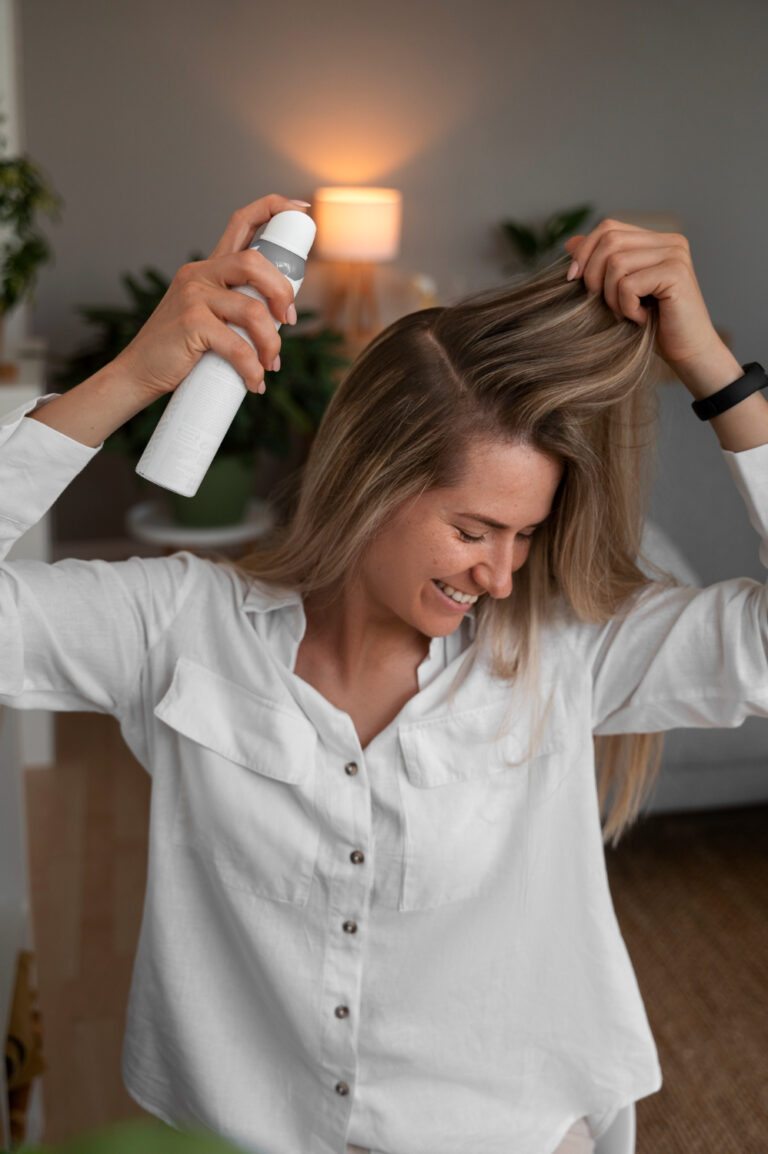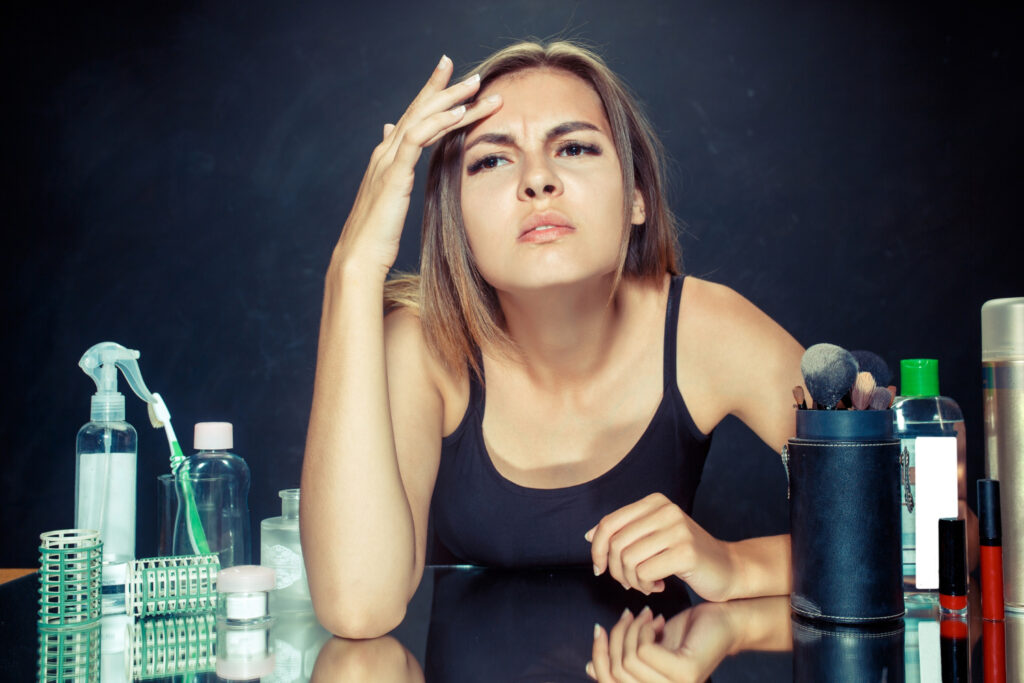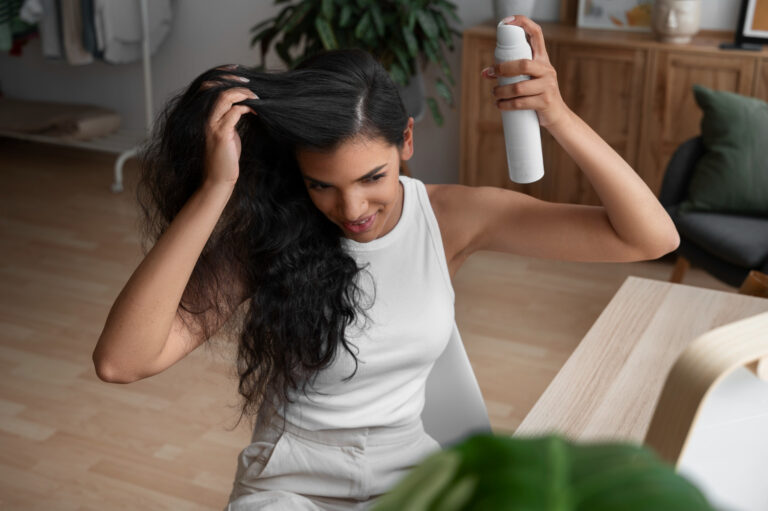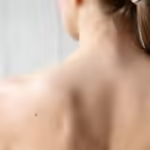Split ends themselves might not be the actual cause of hair fall, yet they may be a factor in hair breaking. This might result in the appearance of further hair loss. The outside covering of the hair shaft, known as the cuticle, is damaged when hair ends split, exposing the underlying layers and making them more brittle. Split ends can weaken the hair and cause it to break off if they are not addressed.
This can lead to reduced hair length and the appearance of thinning or increased hair fall. Split ends can further exacerbate the issue of breaking by making hair more vulnerable to tangling and damage from brushing or combing.
Even though treating split ends on its own might not be able to stop hair loss entirely, keeping healthy hair with routine split end cutting, using the right hair care products, and limiting damage with careful handling can help prevent breakage and improve overall hair health.
How long after stopping minoxidil does hair fall out?

It’s normal for the hair growth that was induced by minoxidil (Rogaine) to progressively diminish and revert to its pre-treatment form after you stop taking the medicine. Nonetheless, there might be large individual variations in the time of hair loss following the cessation of minoxidil use. The following are some broad things to think about:
First Shedding: A few days after stopping minoxidil, some people may go through an initial shedding period. The early transition of hair follicles from the growing phase (anagen) to the resting phase (telogen) is the cause of this loss. This shedding is often transient, lasting anywhere from a few weeks to several months.
Slow loss: As the effects of minoxidil wear off, hair loss may continue gradually after the first shedding period. It may take many months to a year or more for this treatment to show results.
Individual difference: There can be a significant range in the time and severity of hair loss following the cessation of minoxidil use. While some people may see less noticeable hair loss, others may notice more noticeable shedding.
Benign Hair Loss: It’s crucial to understand that minoxidil does not treat the underlying reasons of baldness or female pattern hair loss. Therefore, quitting the medicine may accelerate the development of these illnesses.
Maintenance Treatment: If a person has benefited from using minoxidil, those benefits may disappear if the medicine is stopped. To maintain hair growth, some patients choose long-term or maintenance treatment with minoxidil.
It’s best to speak with a dermatologist or other healthcare provider if you’re thinking about quitting your minoxidil treatment. They can offer you individualized advice based on your unique circumstances and the underlying reasons of your hair loss. They could suggest different courses of action or approaches to successfully control hair loss.
Why are my micro bead hair extensions falling out?

The falling out of your microbead hair extensions might be caused by several factors:
Inadequate Installation: If the extensions were not put in correctly, they could not be firmly affixed to your natural hair, which might cause them to slip or fall out.
Shedding Naturally: It’s common for hair extensions to fall out in the same way as your own hair. People usually shed between fifty and one hundred hairs a day; if your extensions are not fastened properly, the hairs from your shed hairs may come out of them.
Hair Care Routines: A few hair care routines may cause premature hair loss in extensions. Excessive brushing, rough handling, harsh hair treatments, and overly tight hair ties can all create stress on the extensions, leading to their loosening or eventual falling out.
Residue and Oil Build-Up: The glue holding the microbeads to your natural hair can be weakened by an accumulation of debris, oil, or hair products close to the roots of the extensions. This can cause the extensions to slip or fall out.
Care Problems: Improper care of your hair extensions, such as skipping routine visits to tighten the beads, might cause them to come out too soon.
Incompatible Hair Type: Depending on your hair type and texture, hair extensions might not be a good fit for you. Your natural hair may not be able to hold the weight of the extensions if they are too heavy or if it is too fine, which might lead to the extensions falling out.
Rarely, some people may develop an allergic reaction to the materials used in the extensions, which can cause irritation and ultimately need the extensions to be removed.
Can hairspray make your hair fall out?

A popular styling tool for adding volume or structure to hairstyles and holding hair in place is hairspray. Although hairspray isn’t usually known to cause hair loss directly, there are several things that can happen when you use it that can lead to hair issues. Certain hairsprays have abrasive ingredients like propellants and alcohols that can cause the scalp and hair to become parched.
These kinds of hairsprays can cause dryness, breakage, and damage to the hair shaft if they are used often without enough moisturizing and hair care.
This can make hair look thinner and more prone to breaking. Furthermore, hairspray may block hair follicles if it is applied directly to the scalp and is not completely removed, which might result in folliculitis, irritation of the scalp, or transient hair loss. Furthermore, the use of hairspray in combination with tight ponytails or braids—hairstyles that put stress on the hair follicles—can aggravate traction alopecia, a disorder marked by progressive hair loss or thinning brought on by persistent tugging on the hair roots.
Ultimately, even though using hairspray as instructed on occasion is unlikely to result in noticeable hair loss, it’s still important to pay attention to the product’s ingredients, refrain from overusing it or styling your hair in a way that stresses it out, and prioritize proper hair care to preserve the health and strength of your hair.
For individualized guidance and assessment, it is recommended that you speak with a dermatologist or other healthcare provider if you have any unusual hair shedding or problems with your scalp following hairspray use.
you can also
read my old articles about hair fall
Can meth make your hair fall out?
Meth is the street name for methamphetamine, a stimulant substance that is extremely addictive and can have negative psychological and physical consequences on the body. Although abusing methamphetamine can result in a number of health concerns, such as skin conditions and tooth damage, there isn’t much proof that meth usage causes hair loss in and of itself.
However, methamphetamine abuse’s negative effects on lifestyle and health can also indirectly cause hair loss:
Nutritional Deficiencies: Malnutrition and poor eating habits are common side effects of methamphetamine use. A deficiency of vital nutrients, including zinc, biotin, vitamin A, and vitamin E, can damage hair follicles and cause hair loss or thinning.
Dehydration: Due to its strong diuretic properties, methamphetamine can lead to excessive urine and dehydration. Prolonged dehydration can damage hair follicle health and blood flow to the scalp, which may result in hair breakage or loss.
tension and Anxiety: Abuse of methamphetamine has been linked to increased tension, anxiety, and psychiatric problems. Prolonged stress can throw off the regular cycle of hair development and cause telogen effluvium, a disorder marked by excessive hair loss.
Poor Hygiene: People who are addicted to methamphetamine may not take proper care of their personal hygiene, particularly their hair. The combination of methamphetamine’s corrosive effects on skin and hair and poor cleanliness can cause damage to hair follicles and scalp infections.
Secondary Health disorders: Abuse of methamphetamine has been linked to hormonal imbalances and thyroid dysfunction, two disorders that are known to contribute to hair loss.
you may be like to read more about this.
Youtube
recent article






